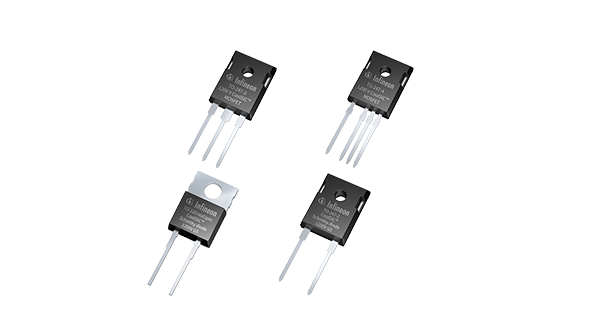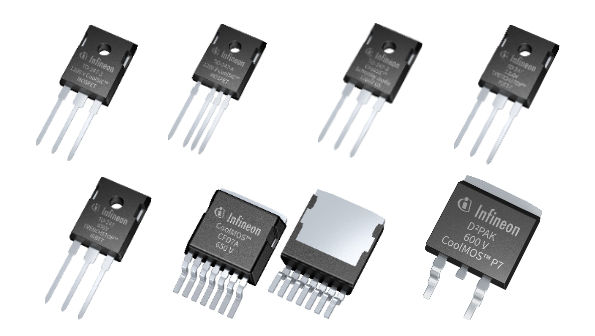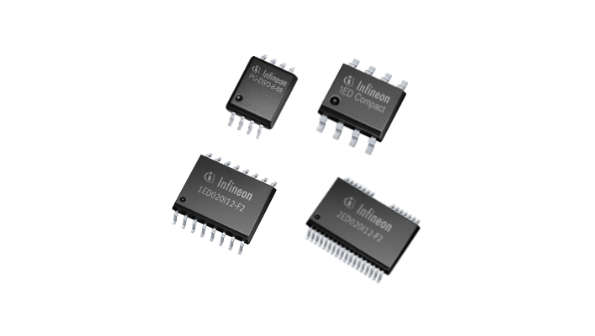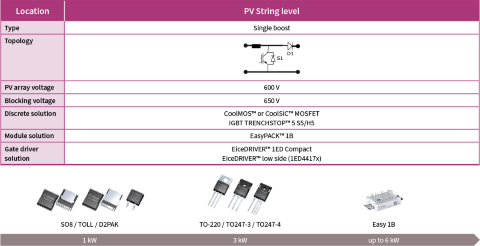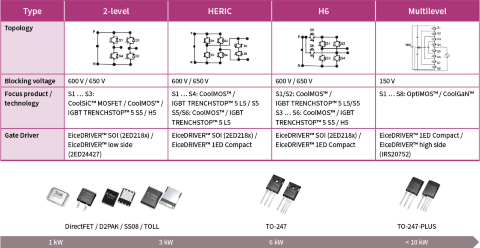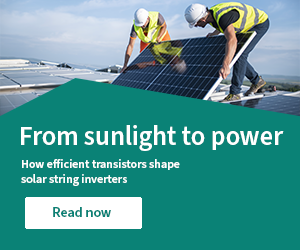单相组串式逆变器解决方案
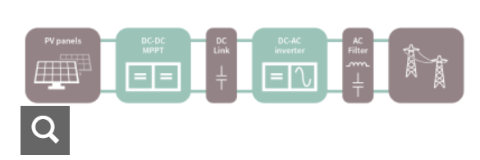
通常情况下,单相组串式逆变器在串联式光伏板上进行电源转换,其额定功率从几千瓦到 15 千瓦不等。而组串式逆变器通常基于两级电源转换。一般而言,大部分逆变器采用无变压器或非隔离变压器设计。首先,DC 转 DC 阶段将可变直流电压转换为固定直流电压,同时通过最大功率点追踪 (MPPT) 技术从光伏板中提取最大电流。DC 转 AC阶段则将直流电源转换成与电网兼容的交流电源。在该阶段,无论是 2 级拓扑还是如 HERIC、H6或Multilevel 等创新拓扑都是首选。特别值得注意的是,创新拓扑因其效率更高、系统成本更低、尺寸小巧和轻便性而饱受青睐。一般而言,单相组串式逆变器连接到 600 V光伏阵列,通常采用 HERIC 和 H6 拓扑结构。逆变器的大小和重量很大程度上取决于交流滤波器和冷却系统,要控制其体积及降低系统成本,高级开关操作不可或缺。
英飞凌产品设计可支持高达 6 KW 的功率
一台功率为 1 KW 到 6 KW 的逆变器很常见。家用逆变器的设计范围从 1KW到 6KW 不等。采用英飞凌分立产品,轻松实现出色性价比。产品丰富,包括我们的OptiMOS™ 、CoolMOS™ 、CoolSiC™ MOSFET、CoolSiC™ 肖特基二极管 、IGBT TRENCHSTOP™5 和 TRENCHSTOP IGBT6。
单相组串式逆变器的发展趋势和要求
另一个显而易见的趋势是朝采用多层次拓扑结构的逆变器发展。这种逆变器可利用基于能提供极低 RDS(ON) 和体二极管回收电荷 Qrr 沟槽拓扑的低压OptiMOS™ MOSFET 开关。 由此降低导通损耗和开关损耗,使其可以实现比传统逆变器更高的效率。与传统拓扑相比的缺陷在于实现多级设计更为复杂,并需要更多的开关和隔离门驱动器。然而,在 3 Kw到 5 KW的范围内的电流水平下,多级设计具有其独特优势,如减少体积和重量、提高效率和功率密度,这些优势在某种程度对冲了复杂性更高的弱势。。
Podcast4Engineers: Solar
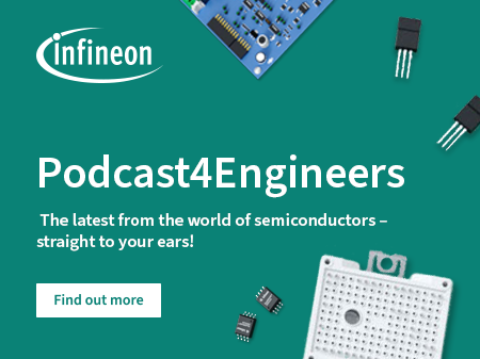
Photovoltaic systems – commonly known as solar power – are driving the shift from fossil fuels and bringing us closer to having abundant, green energy. Innovative and reliable power semiconductors and inverter technologies ensure that harnessing solar power is more convenient, efficient, and attractive.
全新白皮书:太阳能、风能和储能系统的趋势和解决方案

了解太阳能、风能和储能系统的应用和对功率半导体的要求。理解英飞凌如何应对可再生能源和储能系统市场的发展趋势,例如,集成 CoolSiC™ MOSFET 的逆变器。简要浏览各种适用于太阳能、风能和储能系统的解决方案。
应用演示:开发太阳能的无限潜力

本报告将为您概述太阳能应用的拓扑结构、技术趋势和需求。了解更多关于我们所提供的针对不同逆变器种类的产品信息,包括微逆变器,集中式逆变器及组串式逆变器。查阅我们针对您的具体应用场景作出的建议,若有意向,您可以在 5 个月内获得定制模块。
网络研讨会:从太阳能、风能到储能

在网络研讨会上,您将了解可再生能源和储能的新兴应用。了解更多关于应用趋势和需求的信息,并认识英飞凌为这些应用提供的解决方案。

Let’s learn more about how solar inverters work, from the ones we have in our houses, to the ones that are applied in major factories. We will also see how Infineon innovates in power semiconductors for solar inverter technology and how that can help with reducing costs and time to market.

In this module, we will have a look at different solar inverter trends and how the technology is evolving.
And afterwards, we will see what Infineon’s comprehensive solutions for the positioning of solar applications are.
Webinars
Solar and Energy Storage Systems (ESS) are crucial in the energy supply chain. This webinar gives an overview of solar and ESS trends and discusses the importance of residential solar and ESS for renewable decentral energy generation. It will also discuss the different architectures of home energy systems and how Silicon Carbide (SiC) and Gallium Nitride (GaN) can improve performance in various power conversion stages to meet future application trends.
The trend toward smart homes and connected systems demands a common communication interface between all home appliances and a PV inverter to enable a better balance between energy generation and consumption.
The main objective of this webinar is to explain the key technical features and system-level benefits of Infineon's semiconductor solution for string and hybrid inverter systems up to 30 kW output power.
Key Takeaways
1. Discover key technical features and system-level benefits of Infineon's semiconductor solution for string and hybrid inverter systems
2. Examine key drivers and technological requirements in the trend toward higher integration and fan-less operation
3. Explore the role of the PV inverter in the context of the smart home
Keywords: Silicon carbide, SiC, power density, bidirectional, power conversion, efficiency, energy, solar, storage, cost-effective, cost-effective power density, bidirectional power flow capability, high-efficiency power conversion

